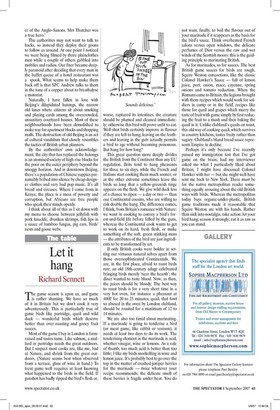Let it hang
Richard Sennett rr he game season is upon us, and game is rather shaming. We have so much of it in Britain but we don't cook it very adventurously. This is particularly true of game birds like partridge, quail and wild duck — wonderful birds which deserve better than over-roasting and gooey fruit sauces.
Most of the game I buy in London is farmraised and tastes tame. Like salmon, a mallard or partridge needs the great outdoors. But I suspect most cooks are, like me, bad at Nature, and shrink from the great outdoors. (Nature seems best when observed from a terrace, glass of wine in hand.) To treat game well requires at least knowing what happened to the birds in the field. If gunshot has badly ripped the bird's flesh or, worse, ruptured its intestines, the creature should be plumed and cleaned immediately; otherwise this bird will prove unfit to eat. Well-shot birds certainly improve in flavour if they are left to hang; leaving on the feathers and leaving in the guts actually permits a bird to age without becoming poisonous. But hang for how long?
This great question more deeply divides the British from the Continent than any EU regulation. Brits tend to hang pheasants for three to six days, while the French and Italians start cooking them much sooner, or at the other extreme sometimes leave the birds so long that a yellow-greenish tinge appears on the flesh. We give wild duck less of a chance to ripen — a day or two — than our Continental cousins, who are willing to risk double the hang. The difference comes, I think, from Britain's romance with Nature: we want in cooking to convey a bird's forest-and-field life before felled by the guns, whereas the Continental cook wants to get to work on its hard, fresh flesh, or make something of the soft, green stinking mass — the attributes of the bird are just ingredients to be transformed by art.
If only British cooks were bolder in setting our virtuous natural selves apart from those oversophisticated Continentals. We are, in the first place, afraid to roast birds rare; an old 18th-century adage celebrated bringing birds merely 'near the hearth'; the diner wanted to taste blood. Now, as then, the juices should be bloody. The best way to roast birds is for a very short time in a very hot oven, for instance a pheasant at 400F for 20 to 25 minutes; quail, that fowl so abused in the oven by London clubland, should be roasted for a maximum of 12 to 14 minutes.
We are also too timid about marinating. If a marinade is going to tenderise a bird (or meat game, like rabbit or venison), it needs at least two days to do its work. The tenderising element in the marinade is acid, whether vinegar, wine or lemons. As a rule of thumb, too much acid is better than too little; I like my birds snorkelling in wine and lemon juice. It's probably best to go over the top in the matter of crushed juniper berries for the marinade — twice whatever your recipe recommends; the delicate smell of these berries is fragile under heat. You do not want, finally, to boil the flavour out of your marinade if it reappears as the basis for the bird's sauce Think overheated French salons versus open windows, the delicate perfumes of Dior versus the raw and wet winds of the Scottish moors: this is the guiding principle to marinating British.
As for marinades, so for sauces. The best British game sauces for birds are rough, Squire Weston concoctions, like the classic Colonel Hawker's Sauce — full of lemon juice, port, onion, mace, cayenne, spring onions and tomato reduction. When the Romans came to Britain, the legions brought with them recipes which would work for soldiers in camp or in the field, recipes like those for quail and grapes which marry the taste of fruit with game simply by first reducing the fruit to a mush and then baking the quail in it. Unlike clubland's quails on toast, this old way of cooking quail, which survives in country kitchens, tastes fruity rather than sugary. Clubland's bland bread sauce represents Empire in decline.
Perhaps it's only because I've recently passed my immigration test that I've got game on the brain; had my interviewer asked me what I particularly liked about Britain, I might have discussed Colonel Hawker with her — but she might well have sent me back to New York. There must be for the native metropolitan reader something equally arousing about the old British ways with birds. Whereas the metropolitan today buys organic-under-plastic, British game traditions made it reasonable that Squire Weston ate with his hands. Rather than sink into nostalgia, take action: let your bird hang; season it strongly; eat it as raw as you can stand.



































































 Previous page
Previous page